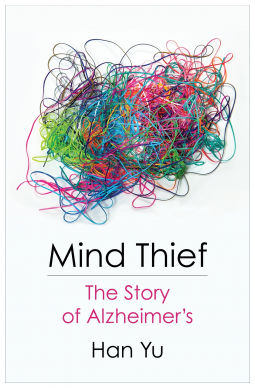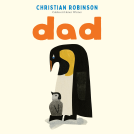
Mind Thief
The Story of Alzheimer's
by Han Yu
This title was previously available on NetGalley and is now archived.
Send NetGalley books directly to your Kindle or Kindle app
1
To read on a Kindle or Kindle app, please add kindle@netgalley.com as an approved email address to receive files in your Amazon account. Click here for step-by-step instructions.
2
Also find your Kindle email address within your Amazon account, and enter it here.
Pub Date Mar 02 2021 | Archive Date Jun 09 2021
Talking about this book? Use #MindThief #NetGalley. More hashtag tips!
Description
Mind Thief is a comprehensive and engaging history of Alzheimer’s that demystifies efforts to understand the disease. Beginning with the discovery of “presenile dementia” in the early twentieth century, Han Yu examines over a century of research and controversy. She presents the leading hypotheses for what causes Alzheimer’s; discusses each hypothesis’s tangled origins, merits, and gaps; and details their successes and failures. Yu synthesizes a vast amount of medical literature, historical studies, and media interviews, telling the gripping stories of researchers’ struggles while situating science in its historical, social, and cultural contexts. Her chronicling of the trajectory of Alzheimer’s research deftly balances rich scientific detail with attention to the wider implications. In narrating the attempts to find a treatment, Yu also offers a critical account of research and drug development and a consideration of the philosophy of aging. Wide-ranging and accessible, Mind Thief is an important book for all readers interested in the challenge of Alzheimer’s.
Advance Praise
"Engagingly written and thoroughly researched, Mind Thief, pulls together the history, biology, and sociology of Alzheimer's disease. The best history of the illness I have read. "
--Peter V. Rabins, Richman Family Professor of Alzheimer Disease and Related Disorders, Emeritus, Johns Hopkins School of Medicine
Available Editions
| EDITION | Other Format |
| ISBN | 9780231198707 |
| PRICE | $110.00 (USD) |
Average rating from 11 members
Featured Reviews
 catherine h, Reviewer
catherine h, Reviewer
I haven't had too much exposure to individuals with dementia in my life, thankfully, but as time has passed, I am experiencing elderly relatives and neighbor's parents, all in their late 80's, early 90's, who are showing signs of mental deterioration. As we, and our society, are living longer, it seems nearly inevitable that many of us will develop some degree of it in time. My experience, though limited, seems to be that keeping one's mind healthy through mind games, reading, etc...seems to keep one's mind functioning much better than those who don't use it as much. Use or lose it seems to be the rule. Healthy lifestyle might help keep you fit, but exercise your minds, too! Good book, with lots of info, sadly, still no cure in sight.
I've always been curious about Alzheimer's disease, since a few of my family members developed the late onset variation of the disease. This book does a great job of explaining how Alzheimer's disease was discovered, the different hypothesises for what causes it, and the different drugs that have been trialed in hopes of finding a preventative, cure, or even a way to slow the progress of the disease. The book does a great job of explaining the science to someone who doesn't have a background in medicine, but didn't seem to over-simplify or avoid complex sounding medical words like "beta-amyloid".
If you're looking for practical advice for reducing risk of Alzheimer's, this isn't the best book for that, but if you want to understand the science behind the different advice you have heard this does a great job of explaining the science.
 Debbie P, Reviewer
Debbie P, Reviewer
This is a very informative book on Alzheimer's. It is one of the most in depth research based books on the subject that I have ever read. It is a must read on the subject, if you have ever had a family member or friend that has had this terrible disease.
You will come away with more knowledge than you ever thought possible, on Alzheimer's disease.
Make sure when reading this book to understand that this disease can happen at all ages.
Thank you Han Yu for taking the time and all the effort put forth in writing this wonderful book. Much appreciated!
D Price
This is one of those rare books that is jam-packed with a lot of dense, technical information that is simultaneously well-presented and baffling. It's well-presented in that by the end of it, I felt like I, someone who has not previously understood the mechanisms theorized to be behind Alzheimer's at all (other than, "uh, brain plaque? I guess?"), now feel like I have as much of a grasp on the subject as, well, some of these drug companies. It's baffling in that after reading this book I feel like I have as much of a grasp on the subject as some of these drug companies.
I went into <i>Mind Thief</i> expecting an historical overview of the way in which Alzheimer's has impacted people and the way in which that has impacted medicine and society. I got that, packed in a humane, sympathetic, and even funny way, and so much more. A huge portion of this book is a run down of all the ways people - predominantly pharmaceutical companies - have tried (and, spoilers, failed) to slow or stop Alzheimer's in the brain. Don't let that turn you off, though. It's fascinating, especially if you're someone who is into the nitty-gritty mechanisms of action behind disease. Do, however, be prepared to get very angry at all the drug companies and their trials that have skipped steps, waste money, and, worse still, wasted time. I'm not saying that any of these drugs would have evolved into something truly groundbreaking or even useful by now, but if companies like Pfizer and Eli Lilly hadn't faffed about with their protocols and changing goal posts, we might at least have a better idea of why so many things failed.
Han Yu takes a simultaneously human- and neuroscience-based look at Alzheimer's (not that those two things can really ever be separated), bringing humor and lightness to a deadly serious discussion without ever losing the sense of import or the accuracy of the science, and never forgetting the people that Alzheimer's affects.
Readers who liked this book also liked:
L.M Montgomery
Children's Fiction, Comics, Graphic Novels, Manga, Teens & YA
Julie Murphy; Sierra Simone
General Fiction (Adult), New Adult, Romance

















